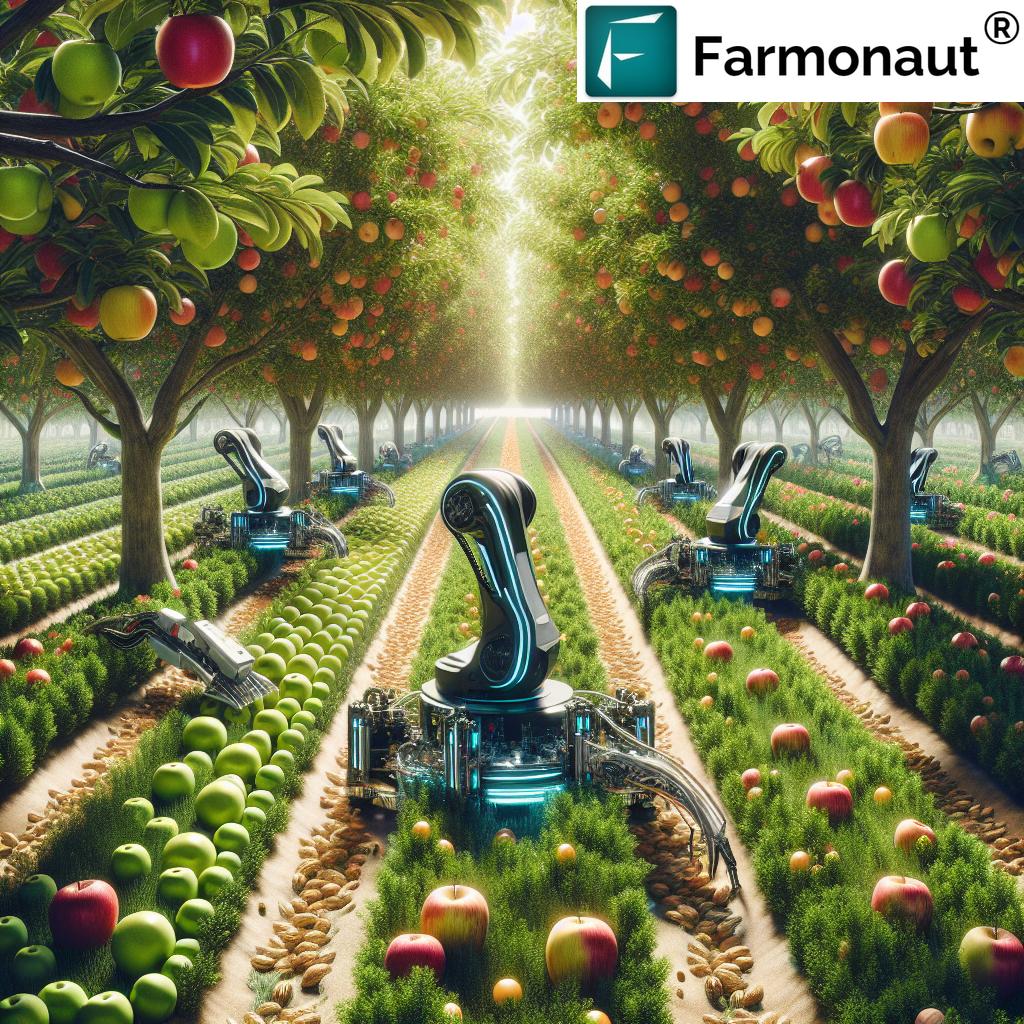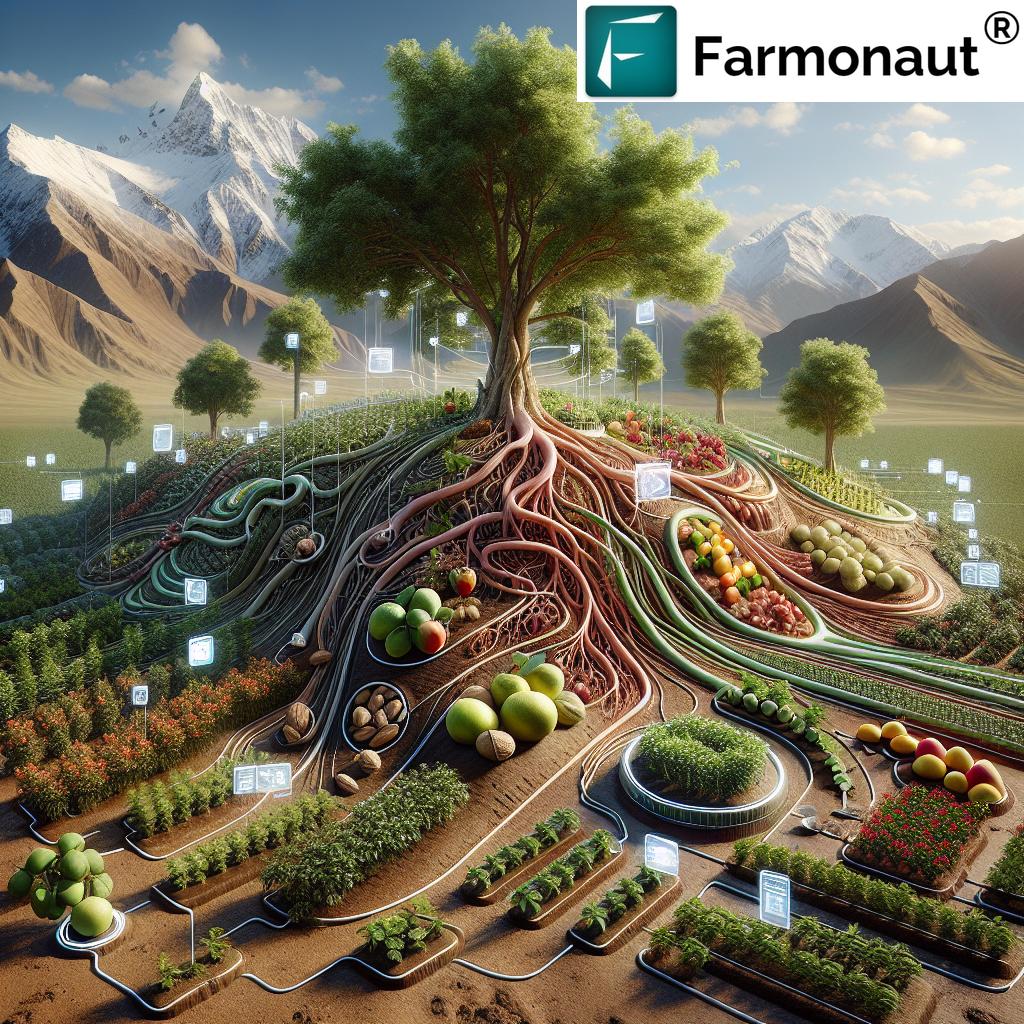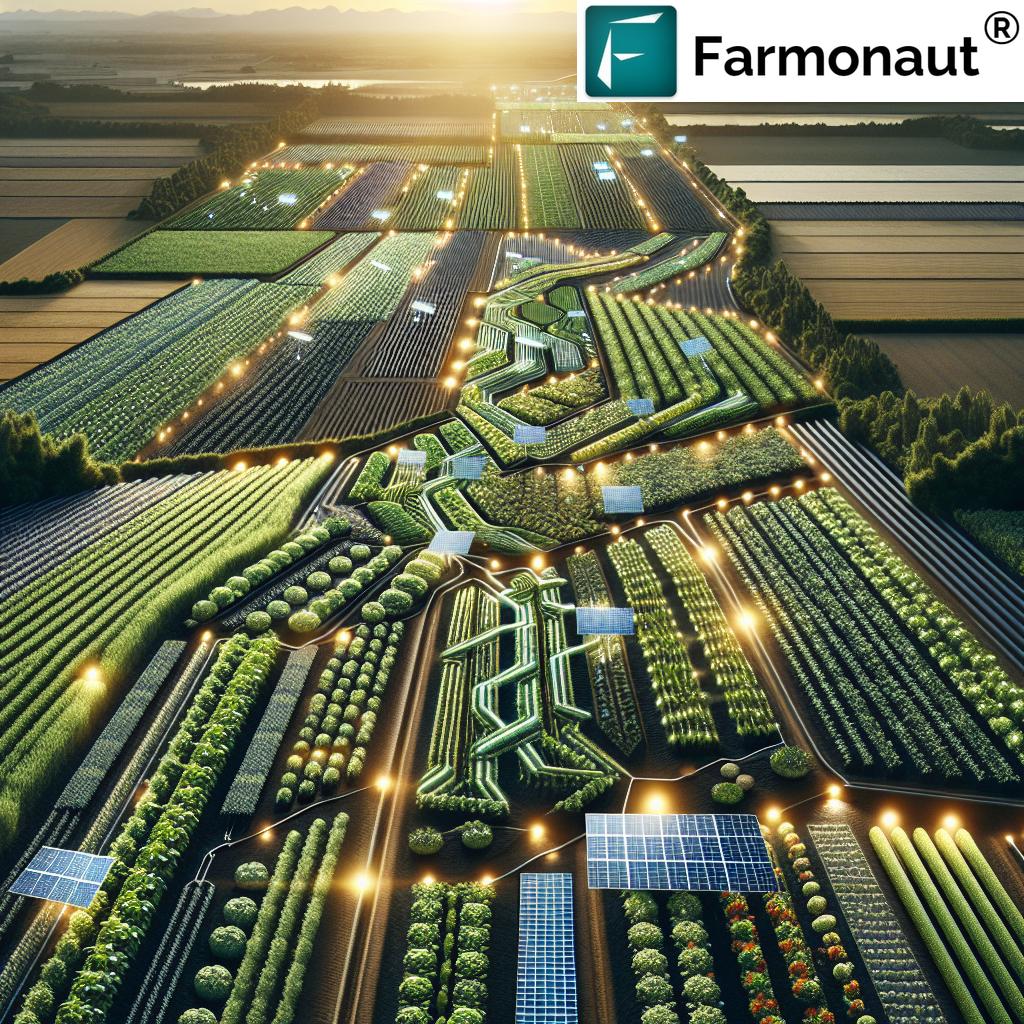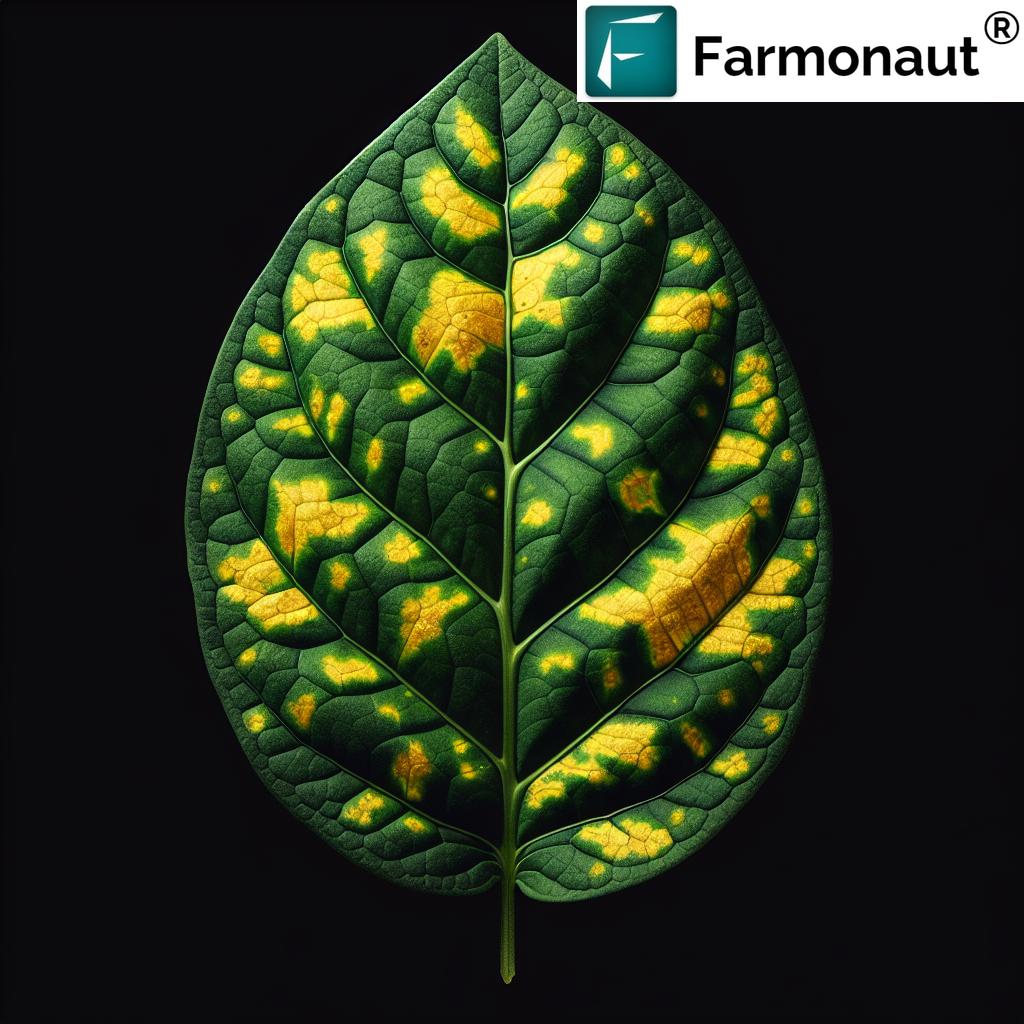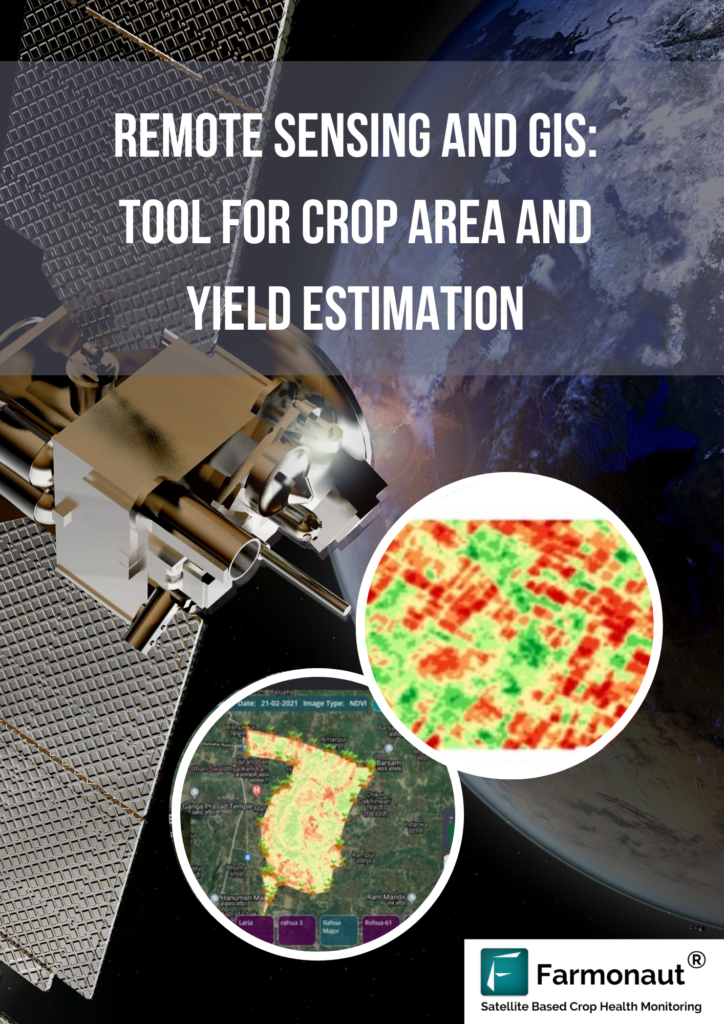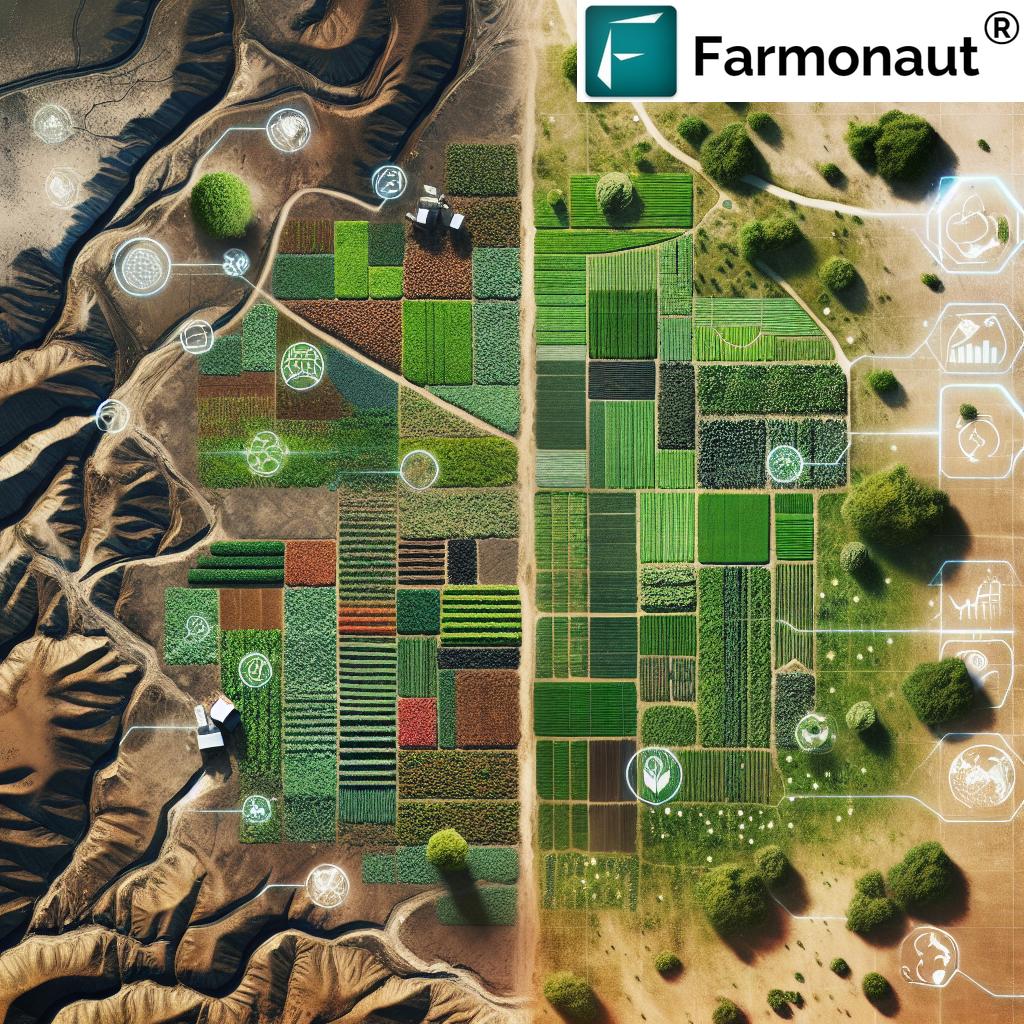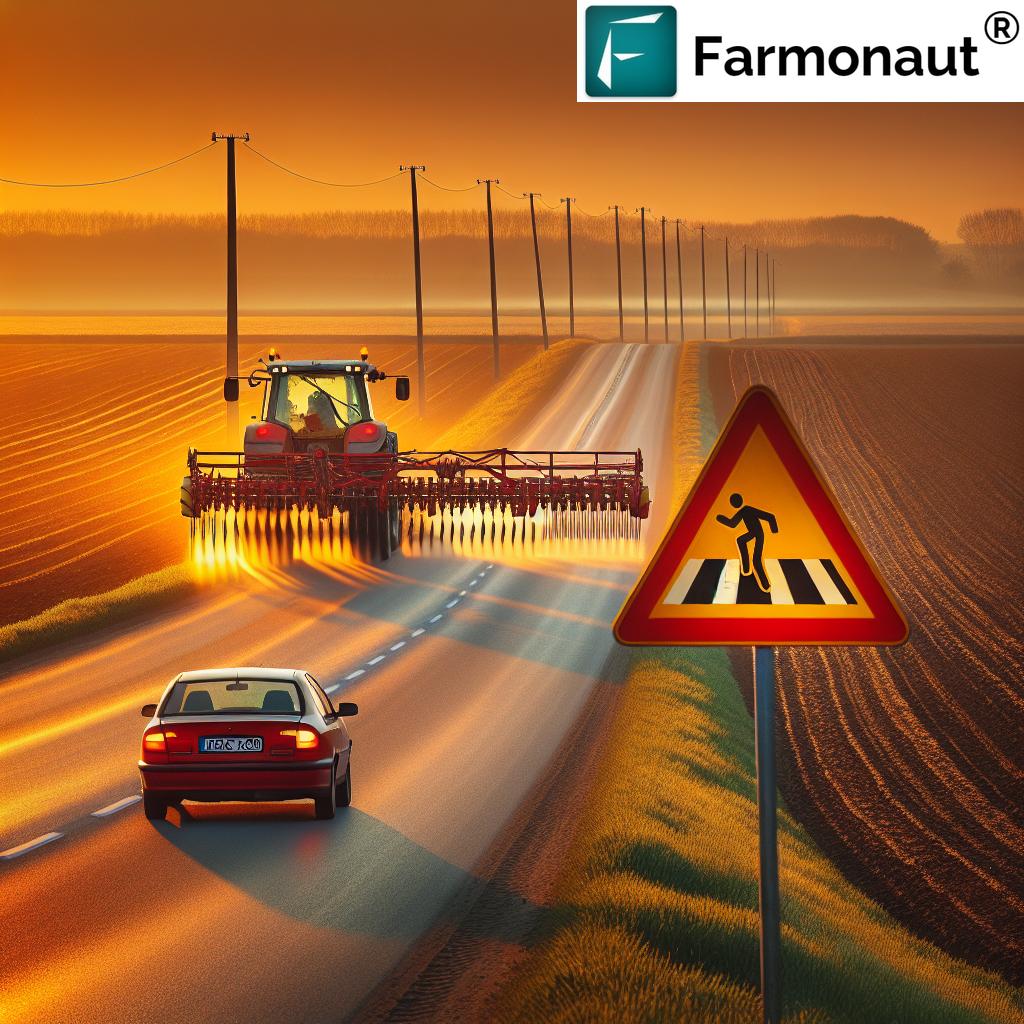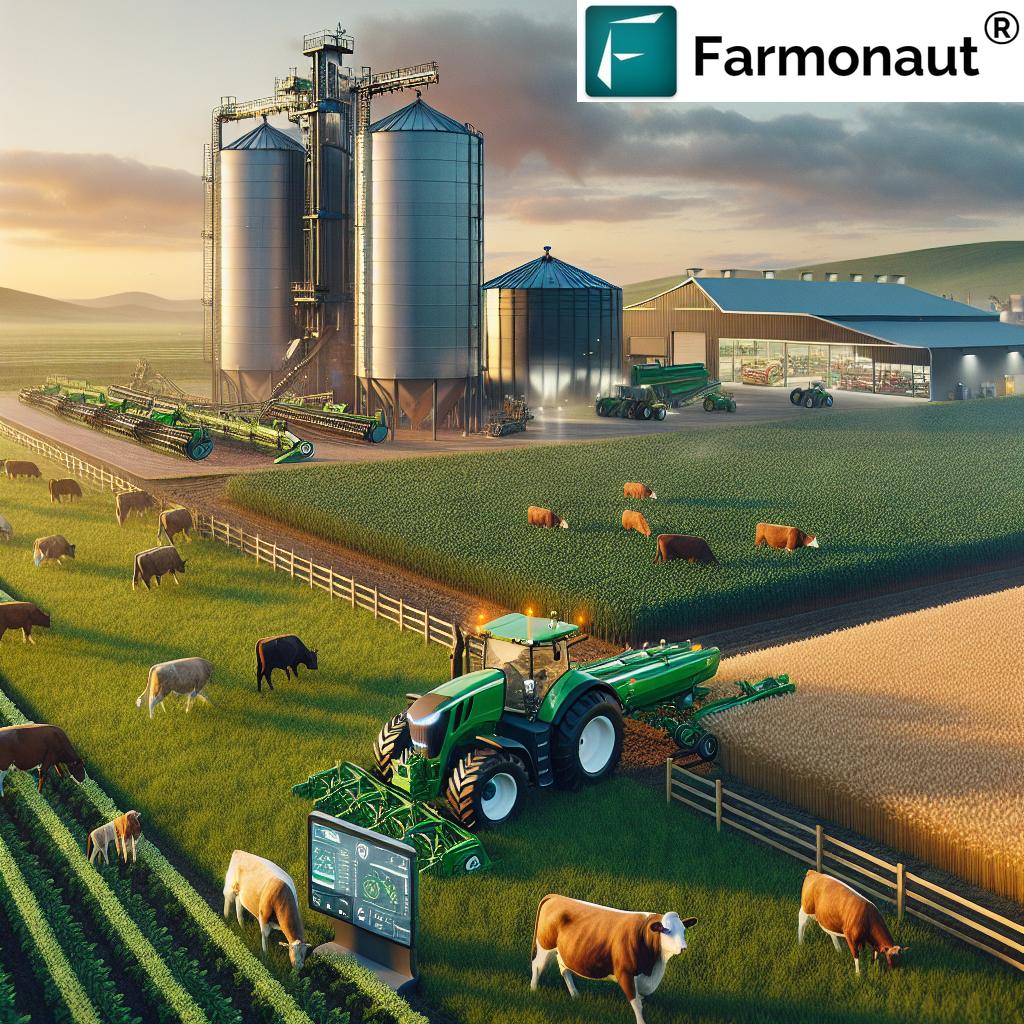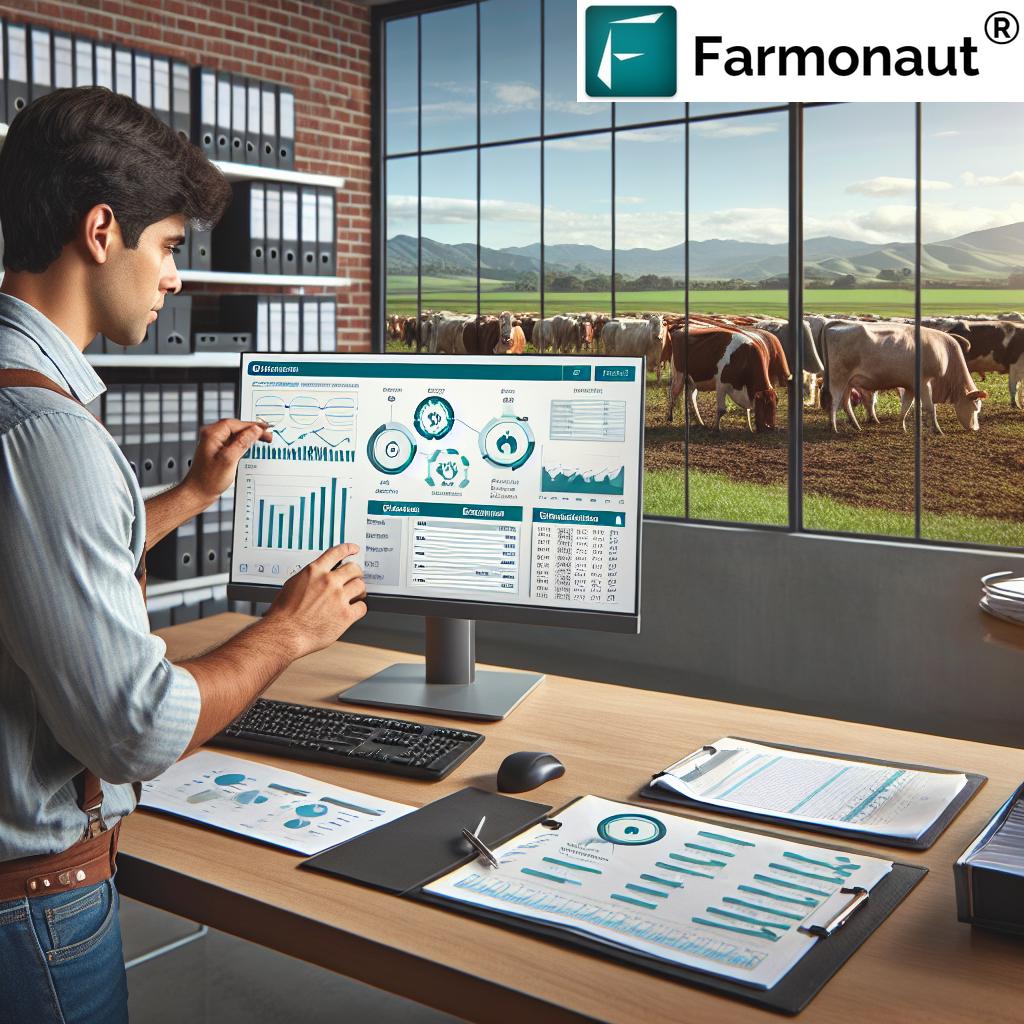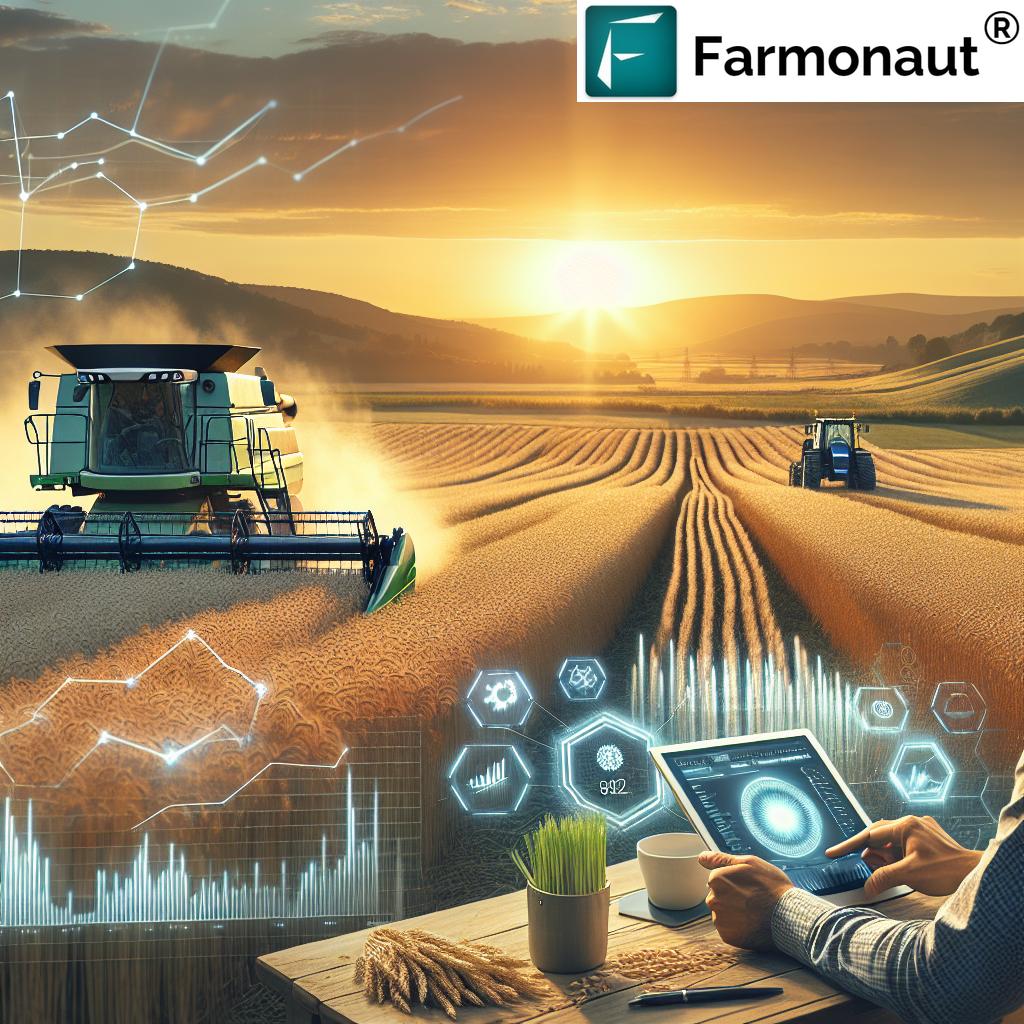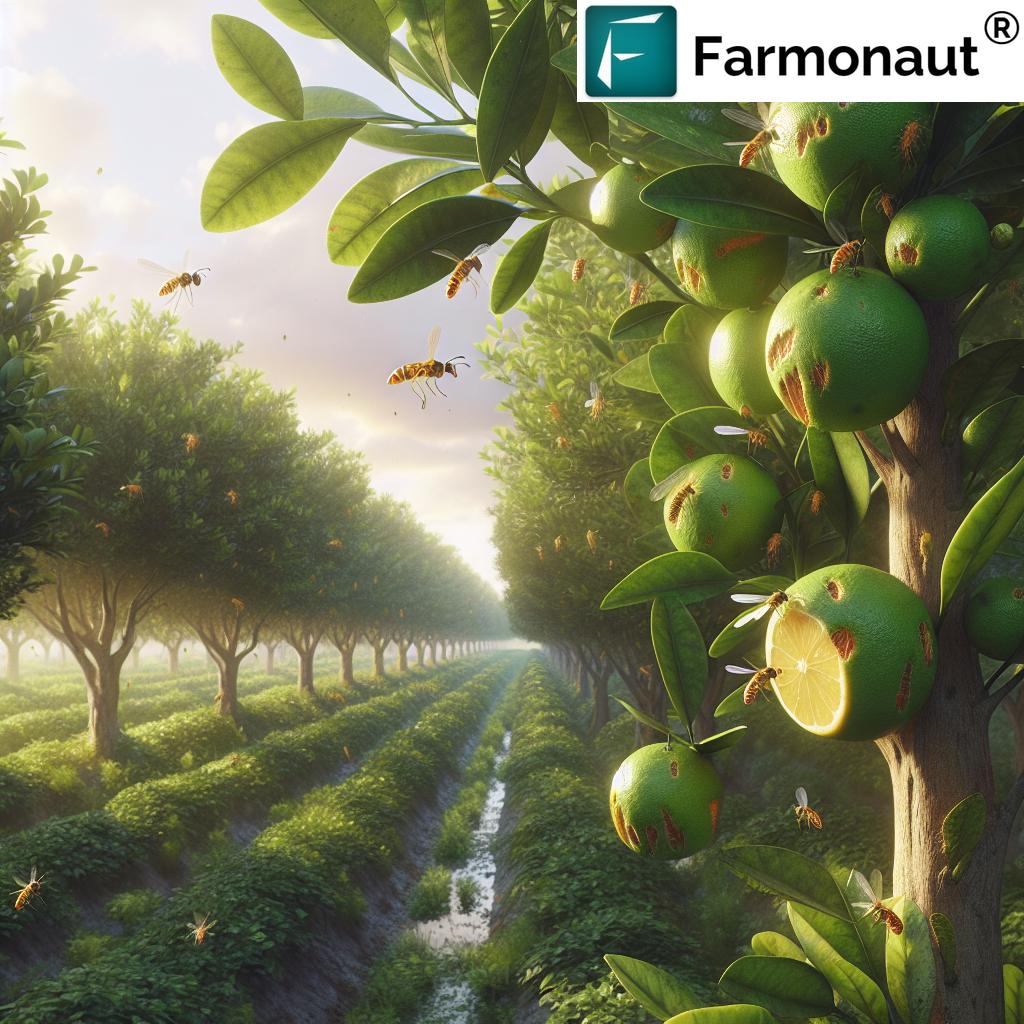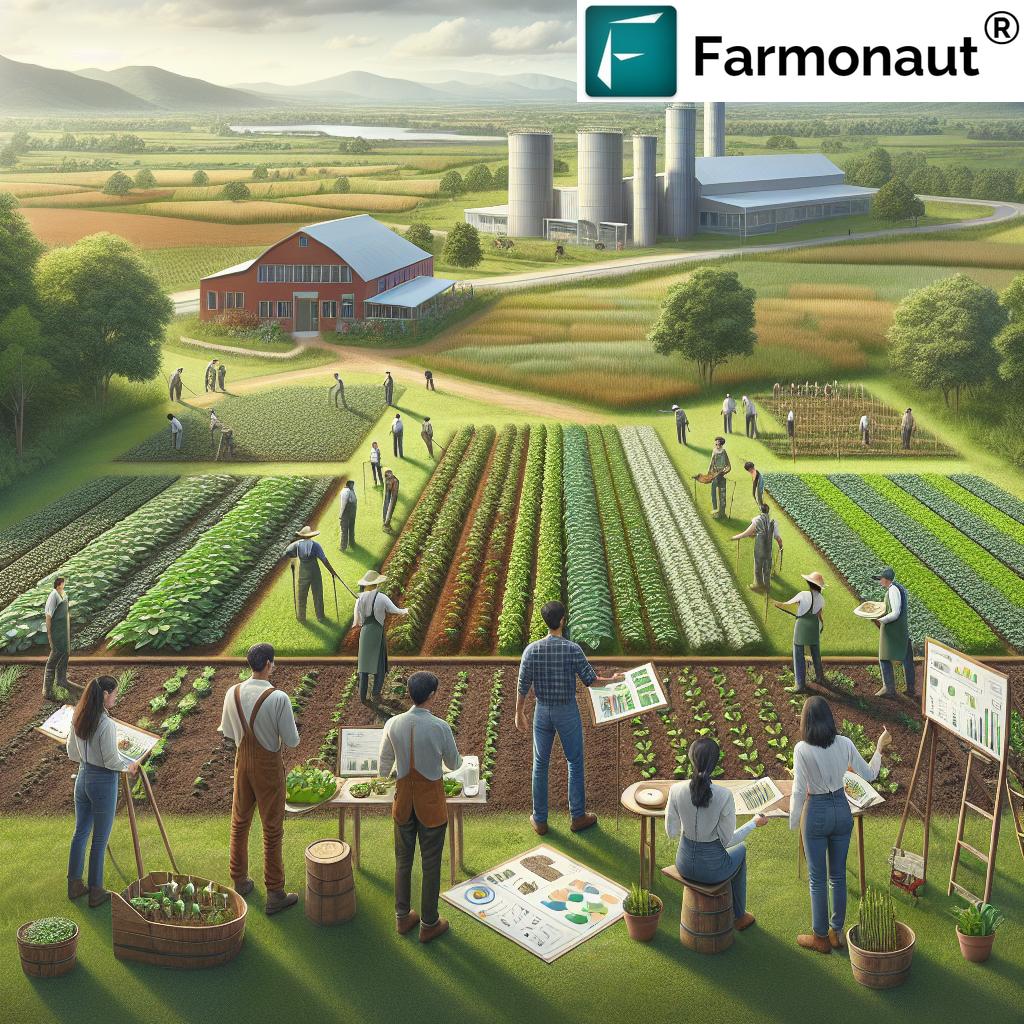Fruit Industry Trends: 7 Shocking Innovations Revealed!
- Introduction: Fruit Industry Trends Transforming Our World
- Trivia: Astonishing Adoption Rates
- Technological Advancements in Fruit Farming
- Precision Agriculture in Fruit Farming
- Robotic Automation in Orchards & Artificial Intelligence in Agriculture
- Sustainable Fruit Production: Practices & Initiatives
- Market Dynamics & Consumer Preferences in Fruit Industry
- Fruit Supply Chain Challenges and Solutions
- Agroforestry Systems: Benefits for the Future of Fruit Farming
- Innovation Impact Comparison Table
- Farmonaut: Revolutionizing Precision Agriculture
- Frequently Asked Questions (FAQ)
- Conclusion: Embracing the Future
“Over 60% of fruit farms adopted AI-powered sorting systems in 2023, revolutionizing quality control and efficiency.”
Introduction: Fruit Industry Trends Transforming Our World
As we enter a new era, the fruit industry is undergoing dynamic transformations that promise to redefine how we grow, distribute, and consume fruits worldwide. Driven by cutting-edge technological advancements in fruit farming, sustainable production practices, a deeper awareness for environmental stewardship, and dramatic market dynamics, the sector is facing both opportunities and challenges. In this comprehensive guide, we explore fruit industry trends that are shaping the future—from precision agriculture and robotic automation in orchards to supply chain innovations and evolving consumer preferences in fruit industry.
Whether you are a grower, agribusiness leader, policymaker, or forward-thinking consumer, understanding these trends is vital for making informed decisions and staying ahead in a market that prizes both efficiency and sustainability.
Our team at Farmonaut has been at the forefront of supporting the industry’s transformation, providing actionable, affordable, and scalable precision agriculture in fruit farming solutions. But the scope of change extends beyond any one platform—so let’s explore the seven most shocking innovations that are rewriting the rules for fruit production, sustainable fruit production, supply, and consumption! (Learn how Farmonaut can future-proof your fruit operations).
Technological Advancements in Fruit Farming: A New Era of Innovation
Technology is the primary catalyst fueling the fruit industry’s transformations. From digitized management systems and advanced robotics to satellite and AI-powered analytics, we’re witnessing a technological revolution that maximizes efficiency, minimizes resource wastage, and optimizes productivity at every stage of the value chain.
The following subsections unpack these advancements and their impact:
Precision Agriculture in Fruit Farming: Data-Driven Excellence
- Definition: Precision agriculture leverages digital tools—drones, sensors, satellite imagery, AI, and connected devices—to monitor and intervene at the smallest scale (tree, row, or plot), enhancing both yields and sustainability.
- Key Functions:
- Soil Moisture & Nutrient Levels: Sophisticated sensors and satellite data monitor real-time moisture and nutrient levels.
- Pest Detection & Early Interventions: Embedded and AI-driven platforms identify infestations and recommend targeted interventions for pest management.
- Optimizing Resource Use: Farms use mapping and data analysis to apply water, fertilizer, and pesticides precisely where needed—reducing wastage.
- Improving Yields: All these measures combine to boost productivity and yields, critical for meeting growing global demand while enhancing sustainability.
We see in leading fruit-producing regions like California, Spain, and Brazil that precision agriculture in fruit farming drives down costs while enabling higher-value, eco-friendly crops.
As an example, platforms like Farmonaut’s satellite-based farm management app democratize access to real-time crop health monitoring, resource management, and AI-powered recommendations worldwide.
Not only do such technologies lead to optimized yields—they also underpin the data-driven advisory that modern farmers require to remain competitive.
Related: Farmonaut’s Large-Scale Farm Management solution empowers fruit growers with seamless monitoring and oversight over vast orchards, driving both productivity and resource efficiency at scale.
“Vertical farming increased fruit yield by up to 40% in urban areas, transforming city-based fruit production.”
Robotic Automation in Orchards & Artificial Intelligence in Agriculture
Revolutionizing Operations and Reducing Labor Shortages
One of the greatest fruit industry trends of the past decade has been the migration from manual, labor-intensive operations to robotic automation in orchards combined with AI-driven management systems. These advances are game-changers, especially for:
- Pruning: Autonomous robots equipped with advanced sensors and precision blades can now prune fruit trees quickly and with unmatched consistency.
- Blossom Thinning: In crops like apples, robotic blossom thinning systems are replacing manual labor, ensuring optimal fruit set and reducing costs.
- Pest and Disease Detection: Artificial intelligence in agriculture is enabling continuous monitoring for early detection of pests and infestations—even before the human eye can spot them.
- Harvesting: By leveraging vision systems and machine learning, next-gen robots identify ripe fruit and harvest them delicately, tackling labor shortages and increasing efficiency.
A detailed study at arXiv.org shows that robotic thinning is nearing performance parity with traditional manual methods—creating opportunities for commercial-scale deployment.
Even more transformative, machine-learning-based embedded systems scan fields constantly, spot anomalies, and generate real-time alerts—empowering farmers to make timely interventions.
Farmonaut offers advanced fleet and resource management tools, providing seamless logistics oversight for agricultural machinery. These systems ensure fruit growers can reduce operational costs by optimizing fleets and enhancing on-field efficiency.
Why AI is the Backbone of Modern Fruit Management
Modern AI-based advisory systems like Farmonaut’s Jeevn AI deliver personalized cropping insights by merging machine learning, satellite imagery, and environmental data. The result? Growers gain a true twin of their orchards, enabling rapid pivots in response to pests, climate, or resource shifts.
Learn more about Farmonaut’s AI-powered agri solutions and a real-world impact in Egypt:
Sustainable Fruit Production: Practices & Initiatives Shaping the Future
With climate change and resource depletion on the rise, sustainable practices have become non-negotiable for the fruit industry. Let’s spotlight the core elements driving this shift:
- Organic Fruit and Nut Market: There is an ongoing boom in demand for organic fruits and nuts. The organic fruit and nut market is projected for substantial growth, reflecting consumer demand for healthier and eco-responsible products (source).
- Reduced Pesticide Use: Growers are adopting agroecological practices which minimize synthetic inputs while maximizing natural pest control and soil health.
- Water Conservation Techniques: From drip irrigation to moisture-sensing automation, efficient use of water is a pillar of modern orchards.
- Biodegradable Packaging & Supply Chain Transparency: Sustainable packaging and traceable supply chains boost eco-credentials and enhance consumer trust (Learn how Farmonaut Traceability assures your fruit products’ journey).
- Carbon Footprinting: Using tools like Farmonaut’s Carbon Footprint tracker, businesses can monitor, manage, and reduce their environmental impact while also simplifying compliance with evolving green standards.
Sustainability is no longer a “nice-to-have”—it’s a market requirement and a competitive advantage. Regulatory bodies globally are responding with incentives for climate-smart agricultural practices and robust reporting requirements—further emphasizing the need for data-driven management.
Market Dynamics & Consumer Preferences in Fruit Industry: Embracing Change
The fruit industry’s evolution isn’t just about farming technology; it’s also about understanding shifting consumer preferences and the ever-adaptive market dynamics.
- Growing Demand for Exotic Fruits and Nuts: Fruits like dragon fruit, acai berries, and macadamia nuts are seeing global surges in consumption due to their nutritional profiles and novelty (Learn more).
- Fragmentation and Industry Consolidation: Advances in technology enable larger operations to achieve scale efficiencies, though they sometimes squeeze out smaller, traditional farms. Notably, U.S. apple-growing operations declined significantly from 2002 to 2017, while larger players solidified their market share (See supply statistics).
- Demand for Transparency & Clean Labels: Today’s consumers want to know where their food comes from, prioritizing traceability and authenticity. Blockchain-enabled platforms like Farmonaut Traceability address this need.
- Health-Focused Purchasing: Immunity-boosting and functional fruits (high in antioxidants, vitamins) are outperforming conventional varieties.
To capture these opportunities—and hedge the risks—growers must continuously monitor consumer trends, diversify product lines, and consider global export possibilities.
Empowering Growers with Digital Access
Farmonaut’s farm management app is accessible on all major platforms—Android, iOS, and web browsers. Growers globally—from California to Brazil, India to Spain—utilize our platform for precision agriculture, making data-inspired decisions from city offices or field sides.
You can also leverage Farmonaut’s Public API (API | API Developer Docs) to integrate advanced agricultural data into your own fruit supply chain, marketplace, or research tools.
Fruit Supply Chain Challenges: Overcoming Disruptions and Ensuring Quality
Despite technological leaps, supply chain challenges remain a major concern within the fruit sector. Let’s analyze the central hurdles and their solutions:
- Climate-Related Disruptions: Extreme weather and increasingly volatile climate patterns impact crop yields, harvest timing, and overall business planning.
- Labor Shortages: Scarcity of skilled and seasonal pickers continues to hinder time-sensitive operations—further driving the adoption of automation and robotics.
- Global Transportation Woes: Shipping congestion, delays, and higher costs in global logistics hurt fruit distribution and market access.
- Regulatory Compliance: Tougher food safety and traceability laws demand new technology investments for compliance and transparency.
Advanced resource management systems play a critical role here. For example, Farmonaut’s Fleet Management and Carbon Footprinting tools help agribusinesses optimize logistics, ensure eco-compliance, and visualize real-time impact.
Meanwhile, blockchain-based traceability systems are now essential for any grower or exporter that wants to supply to EU, US, or major Asian markets. They provide both quality assurance and an immutable record—building trust with buyers and end consumers.
You can also leverage Farmonaut’s Crop Loan and Insurance Verification tools to streamline access to credit and insurance coverage through satellite-based field validation, reducing fraud and improving farmer access to financial support.
Agroforestry Systems Benefits: A Nature-Based Solution for Fruit Farming
While advanced tech trends steal headlines, nature-based solutions are quietly reshaping the industry for the better. Agroforestry systems—which integrate trees, crops, and sometimes livestock—offer transformative environmental and economic benefits:
- Enhanced Biodiversity: Blending fruit trees with diverse crops or woodlots increases pollinator populations and reduces pest pressure.
- Improved Soil Structure: Deep-rooted trees stabilize topsoil and boost water infiltration, reducing the risk of erosion or fertility loss.
- Natural Climate Solutions: By increasing tree cover, agroforestry stores significant quantities of carbon, making orchards more resilient while actively contributing to climate mitigation.
- Diversified Incomes: Growers can harvest fruits, nuts, timber, and sometimes medicinal plants or honey—spreading risk and unlocking new market opportunities.
- Sustainable Land Use: This approach is lauded for its ability to restore degraded land, improve microclimates, and enhance the overall sustainability of fruit landscapes.
The adoption of agroecological and agroforestry systems aligns with broader sustainability trends, fostering resilience across global fruit supply chains (Learn more about agroforestry).
If you’re interested in integrating agroforestry or multi-layered cropping into your farm strategy, Farmonaut’s Crop Plantation & Forest Advisory tools can support project planning, monitoring, and long-term land restoration.
Innovation Impact Comparison Table: Fruit Industry Advancements at a Glance
| Innovation Name | Description | Technology Used | Estimated Adoption Rate (%) | Sustainability Benefit |
|---|---|---|---|---|
| AI-powered Crop Monitoring | Real-time health/infection/stress detection for optimizing inputs and interventions. | Satellite imagery, artificial intelligence, machine learning | 60% | High – reduces input waste, improves yields, lowers carbon footprint |
| Precision Irrigation | Localized, sensor-driven water delivery for minimal losses and optimal growth. | IoT sensors, automation, satellite monitoring | 45% | High – conserves water, boosts resource use efficiency |
| Drone-based Harvesting | Autonomous drones that pick/transport fruits with minimal labor. | Drones, machine vision, robotics | 15% | Medium – reduces labor demand but energy consumption considerations |
| Biodegradable Packaging | Compostable and eco-friendly materials replacing plastics in the chain. | Material science, supply chain innovation | 35% | High – reduces environmental pollution/waste |
| Blockchain Traceability | Secure, tamper-proof tracing of fruit products’ journey farm-to-table. | Blockchain technology | 25% | Medium/High – enhances consumer trust, ensures compliance |
| Robotic Thinning & Pruning | Automated systems for blossom thinning and tree pruning. | Machine vision, robotics, AI | 30% | Medium – improves labor efficiency, precise resource use |
| Agroforestry Implementation | Integrating fruit/nut trees with crops/livestock for ecosystem services. | Ecological design, land management, mixed farming | 12% | High – sequesters carbon, enhances biodiversity, restores soils |
This table spotlights the range and relative impact of leading fruit industry trends—from artificial intelligence in agriculture to supply chain upgrades—helping stakeholders visualize where the industry is headed.
Farmonaut: Revolutionizing Precision Agriculture in Fruit Farming
At Farmonaut, we envision a world where precision agriculture is accessible to every fruit farmer—regardless of scale, location, or resource constraint. Here’s how our platform is transforming fruit, nut, and orchard management worldwide:
- Satellite-Based Crop Health Monitoring: We harness the power of multispectral satellite imagery to deliver insights on vegetation health, soil moisture, nutrient levels, and stress events, enabling growers to react swiftly.
- AI-Driven Advisory: Our Jeevn AI advisory system combines artificial intelligence with weather and satellite data for on-the-go, customized recommendations—optimizing productivity and minimizing resource use.
- Blockchain-Based Traceability: Transparent, secure, and consumer-facing, our blockchain solution tracks every stage of your fruit’s journey, building market trust and simplifying export documentation.
- Resource Management & Carbon Footprinting: From fleet management to carbon footprint assessment, our tools empower businesses to operate sustainably at scale.
- API & Integration: Our API (sat.farmonaut.com/api) and developer docs let agritech platforms and research projects easily incorporate Farmonaut insights.
- Scalable, Subscription-Based Access: Choose the plan that fits your acreage and reporting needs. Browse our pricing below!
All of our services are optimized for mobile responsiveness and field use. Download the Farmonaut App for Android or iOS, or call up our web app for seamless, on-the-go orchard and fruit supply chain management!
Frequently Asked Questions (FAQ): Fruit Industry Trends & Technology
What are the most future-proof fruit industry trends right now?
Technological advancements in fruit farming (notably precision agriculture, robotics, and blockchain traceability), sustainable fruit production, and adaptive responses to changing consumer preferences and supply chain disruptions are the key drivers for the next decade.
How does precision agriculture in fruit farming boost yields and reduce costs?
By utilizing IoT sensors, satellite imagery, and AI-based analytics, precision systems enable targeted interventions, optimizing resource use (like water and fertilizers) and detecting crop stress or pest outbreaks early—directly leading to improved yields and lower operational costs.
Is sustainability just a trend or a necessity for fruit growers?
Sustainability has shifted from trend to necessity. Climate change, regulatory requirements, and consumer expectations mean sustainable practices—including organic farming, agroecological principles, and holistic water management—are now business imperatives.
What are the main challenges in the fruit supply chain?
Climate volatility, labor shortages, logistical disruptions, and an increasingly complex regulatory environment present substantial challenges. Technology—especially in real-time monitoring and traceability—is essential to overcome these hurdles and maintain supply chain resilience.
How can small and medium-sized fruit growers access advanced technologies affordably?
Platforms like Farmonaut provide scalable, subscription-based, and API-accessible solutions, enabling even smaller growers to use satellite monitoring, AI-driven decision support, and resource management tools—leveling the playing field with larger operations.
How do consumers influence fruit industry trends?
Consumer preferences for exotic varieties, transparency, sustainability, and health-boosting products dictate which crops see booming demand, how they’re grown, and the supply chain information required for market access.
Conclusion: Embracing the Future of Fruit Industry Trends
As our exploration of fruit industry trends reveals, the sector stands at the crossroads of innovation and responsibility. From the adoption of precision agriculture, artificial intelligence in agriculture, and robotics, to a renewed focus on sustainability and ecosystem-based farming, stakeholders must stay agile to thrive.
At the heart of the transformation is technology—like that offered by Farmonaut—delivering scalable, affordable, and data-rich solutions for crop health monitoring, supply chain transparency, resource and fleet management, and beyond.
To succeed in tomorrow’s global fruit markets, we must embrace ongoing change—testing new systems, nurturing sustainability, adapting to market shifts, and putting actionable data at the core of every decision.
Ready to transform your fruit farm or business with precision technology?
- Explore our web app, Android app, or iOS app
- Contact our experts to discuss traceability, fleet optimization, carbon footprint tracking, and other solutions
- Integrate Farmonaut’s advanced analytics with your systems via public API
The future of fruits is bright, bold, and brimming with opportunity. Let’s seize it—together!


